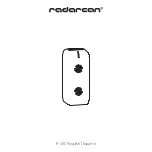
36
6 –
DO LIST ONCE
Set the ACL to call-out only once each of the ACL recipients.
7 –
CALL-OUT SEQUENCE NUMBER
Order into which the listed recipients will be called. 1 is first, 10 is last.
8 –
MOVE UP & DOWN
Change the calling order of a recipient. Highlight a recipient, then move it up or down the list.
9 –
DEFAULT DESCRIPTION
Recipient’s description. Allows to give a description to a recipient. Examples:
Mike’s Office, John’s cell, Night
technician, email
,
Chief Engineer cellphone
,
Firefighter Pager
,
Studio FAX
,
Manager’s email
, etc.
10 –
ALTERNATE DESCRIPTION
Non-unicode text description. Used for FAX and SMS only (a cellular modem with is required to send SMS directly
from the Cortex).
11 –
READ
Read the screen content (select the ACL to be read from the top menu ID box).
12 –
UPDATE
Update the screen content after changes have been made.
13 –
ERASE
Erase or delete any screen content.
14 –
TYPE
Type of alarm output (Email, voice, FAX…). Note that this field will determine what type of information will need to
be entered into the Telephone/IP address field.
15 –
TELEPHONE / IP ADDRESS
Telephone number or email address of the recipient.
16 –
CALLOUT DEVICE
Means by which the alarms will go out (Ex. Ethernet (IP), Modem (FAX, Voice), etc.)
17 –
PAGER / SMARTPHONE
Indicates whether a smartphone or Pager is registered in the unit.
18 –
REFRESH / READ
Refresh / read the screen content.
19 –
SAVE
Save the screen content.
20 –
EXIT
Exit menu.
Summary of Contents for Cortex Series
Page 2: ...2...
Page 5: ...5...
Page 9: ...9 1 3 Specifications...
Page 18: ...18 2 4 2 Jumpers for the Cortex 320 Jumpers and switches location on the Cortex 320 main board...
Page 91: ...91...
















































